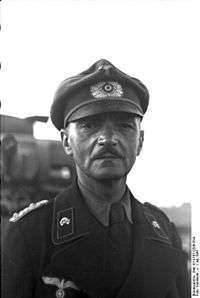Curt von Jesser
| Curt von Jesser | |
|---|---|
 | |
| Born |
4 November 1890 Wadowice |
| Died |
18 August 1950 (aged 59) Vienna |
| Allegiance |
|
| Service/branch | Heer |
| Years of service |
1909–38 (Austria) 1938–45 (Germany) |
| Rank |
Oberstleutnant (Austria) Generalmajor (Germany) |
| Commands held |
Panzer-Regiment 36 155. Reserve-Panzer-Division |
| Battles/wars | |
| Awards |
Knight's Cross of the Iron Cross German Cross in Gold |
Curt von Jesser (4 November 1890 – 18 August 1950) was a highly decorated Generalmajor in the Wehrmacht during World War II. He was also a recipient of the Knight's Cross of the Iron Cross. The Knight's Cross of the Iron Cross was awarded to recognise extreme battlefield bravery or successful military leadership. Curt von Jesser was captured by British troops in 1945 and was released in 1949.
Jesser was born on November 4, 1890 in Wadowice as the son of future Austrian-Hungarian Feldmarschalleutnant Moritz von Jesser. Young Curt entered the Austrian Army on August 18, 1909 with the rank of Kadett-Offiziersstellvertreter and was assigned to the 6th Rifle-Regiment (Schützen Regiment 6).
Awards and decorations
- Knight's Cross of the Iron Cross on 18 January 1942 as Oberst and commander of Panzer-Regiment 36[1]
- German Cross in Gold (29 November 1941)
- Iron Cross, 1st Class (1939)
- 1939 Clasp to the Iron Cross 2nd Class
- Austrian Military Merit Cross, 3rd class with War Decoration (World War I award)
- Austrian Military Merit Medal in Silver with Swords (World War I award)
- Austrian Military Merit Medal in Bronze with Swords (World War I award)
- 1914 Iron Cross 2nd Class (World War I award)
- Karl Troop Cross (World War I award)
- Austria-Hungary Wound Medal (World War I award)
- Austrian War Commemorative Medal with Swords
- Hungarian War Commemorative Medal with Swords
- Honour Cross of the World War 1914/1918
- Eastern Front Medal
- Panzer Badge in Silver
- Wehrmacht Long Service Award 1st Class
References
Citations
- ↑ Fellgiebel 2000, p. 201.
Bibliography
- Fellgiebel, Walther-Peer (2000) [1986]. Die Träger des Ritterkreuzes des Eisernen Kreuzes 1939–1945 — Die Inhaber der höchsten Auszeichnung des Zweiten Weltkrieges aller Wehrmachtteile [The Bearers of the Knight's Cross of the Iron Cross 1939–1945 — The Owners of the Highest Award of the Second World War of all Wehrmacht Branches] (in German). Friedberg, Germany: Podzun-Pallas. ISBN 978-3-7909-0284-6.
- Patzwall, Klaus D.; Scherzer, Veit (2001). Das Deutsche Kreuz 1941 – 1945 Geschichte und Inhaber Band II [The German Cross 1941 – 1945 History and Recipients Volume 2] (in German). Norderstedt, Germany: Verlag Klaus D. Patzwall. ISBN 978-3-931533-45-8.
- Scherzer, Veit (2007). Die Ritterkreuzträger 1939–1945 Die Inhaber des Ritterkreuzes des Eisernen Kreuzes 1939 von Heer, Luftwaffe, Kriegsmarine, Waffen-SS, Volkssturm sowie mit Deutschland verbündeter Streitkräfte nach den Unterlagen des Bundesarchives [The Knight's Cross Bearers 1939–1945 The Holders of the Knight's Cross of the Iron Cross 1939 by Army, Air Force, Navy, Waffen-SS, Volkssturm and Allied Forces with Germany According to the Documents of the Federal Archives] (in German). Jena, Germany: Scherzers Miltaer-Verlag. ISBN 978-3-938845-17-2.
| Military offices | ||
|---|---|---|
| Preceded by Generalleutnant Franz Landgraf |
Commander of 155. Reserve-Panzer-Division 24 August 1943 – 6 September 1943 |
Succeeded by Generalleutnant Franz Landgraf |
This article is issued from Wikipedia - version of the 11/30/2016. The text is available under the Creative Commons Attribution/Share Alike but additional terms may apply for the media files.